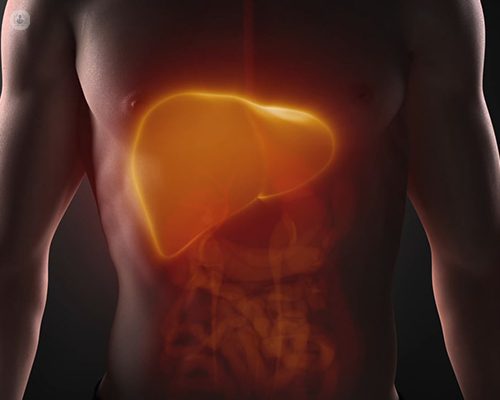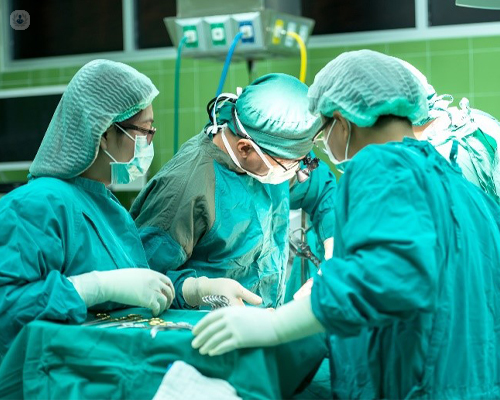Liver cancer: what to expect
Escrito por:Professor Giles Toogood is a highly experienced consultant hepatobiliary surgeon (surgeon of the liver, bile duct, and pancreas) and general surgeon. He treats liver cancer on a frequent basis, especially secondary liver cancer, and here he explains what to expect from treatment by answering common questions.

Types of liver cancer
There are two types of liver cancer. Primary liver cancers are those that originate in the liver. Secondary liver cancers originate from another part of the body but spread to the liver.
Who is most at risk of liver cancer?
The most common type of primary liver cancer is hepatocellular carcinoma (HCC) and people with cirrhosis are most prone to this type of cancer. Causes of cirrhosis are alcohol and viral hepatitis infections, and so it’s important to monitor your alcohol consumption and liver health. Gender and age not a factor.
What is the first sign of liver cancer?
In both primary and secondary liver cancer, first signs tend to be jaundice and liver failure, depending on where exactly the tumour is. Many people with tumours may not have any symptoms at all: pain is not a sign of liver cancer.
If it’s a primary liver tumour, then patients often show symptoms once the tumour is very big, and it’s only when the mass becomes such a size that there are vague symptoms of discomfort. Sometimes liver cancer originates from the bile duct, and this form of primary cancer can result in painless obstructive jaundice. This is when the bile produced by the liver is blocked from leaving.
Eventually, as with all cancers, if left untreated a person becomes weak and exhausted, they’ll lose weight and muscle and concentrating may gradually become more difficult.
The link between liver and bowel cancer
It’s very common for people with bowel cancer to get liver cancer. When we eat, all the nutrients we consume get broken down and then passed up blood vessels into liver, which breaks the nutrients down. One of the ways that any cancer can spread is via the blood system. Cancer cells from the bowel travel up these same blood vessels and the first place they get stuck is in the liver.

What happens when you have liver cancer?
In cases of secondary liver cancer, if the disease has spread from the bowel to only the liver (and no other organ), we have a chance of reaching a cure if we remove it surgically from both parts of the body.
With primary liver cancer, surgery is also an option. However, this is often identified late due to a lack of visible symptoms and there aren’t many other treatments with a high chance of success.
In any circumstance, your medical expert will provide you with advice on the best course of treatment for your individual case.
Does liver cancer spread quickly?
Liver cancer can spread quickly or slowly: it depends on the individual. Sometimes, surgeons operate to remove cancerous tissue from a patient and find later, during a follow-up scan, that another tumour has grown rapidly. However, further tests are always performed to check that slow or fast-growing tumours aren’t missed.
What is life expectancy with liver cancer?
The prognosis depends on when the tumour is caught and the type of tumour. With an operation to remove cancerous tissue, patients usually have a 50 per cent chance of cure within 5 years or later.
When caught early, the chance of successful treatment is higher. Whenever you feel doubtful of your health, be sure to get checked out. While the prognosis and treatment can seem daunting, there are many surgical experts with experience to help you reach your maximum chance of cure.
Professor Toogood’s is highly experienced in liver surgery among other types of surgery. Visit his profile to learn more and to book your consultation.



